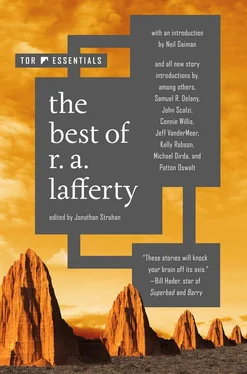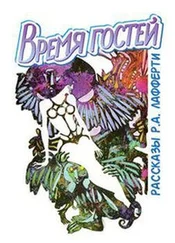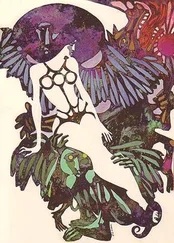“I catch onto all the new and enjoyable advances in ship control quicker than ‘he’ would,” Chancel’s ghost spoke softly. “Oh, he has the physical brains with him, most of them; but I have the intuition. And he, we, were never very good on brains anyhow. We had the mystique and the personality, we had the intuition, we guessed a lot, and we faked a lot. But we were never a well-linked personality.”
“Just how does one become a ghost?” Gladys Marclair asked. “Besides dying, I mean, is there any way to bring it about?”
“It happens, in many cases, long before death. I was his ghost here for twenty years (Earth years) before Chancel died elsewhere. He left his (my) ghost here on his second landing. He came back here for me several times after that, but I wouldn’t rejoin him or go away with him. He had become quite cranky in his ways, and I in mine. There would have been everlasting conflict if we had joined. But it was also psychic disaster (more for him than for me) for us to be separated.
“It’s not at all rare for a living person to be separated from his ghost. I see that two of you six have become separated from your own ghosts, and none of you can guess which two of you it is. On Thieving Bear, the conditions seem to be favorable for these split-ups. It leaves a great hunger (yes, a physical hunger) in the ghosts who are left behind. But each planet has its own ghostliness that is different from that of other places. Even Old Earth has remnants and tatters of ghostliness, and it isn’t a hungry world. As a prophet said, ‘Happy the world that has iron meadows and rich essences on which the spirits may feed, and then go to sleep.’ But we spirits are most often sleepless here.”
“What happened to Dixie Late-Lark?” Gladys Marclair asked this pleasant ghost.
“Oh, she’s a ghost of a different sort. There never was any Dixie Late-Lark as a person. There were only the six of you who arrived here. Dixie was your esprit de group, your group effigy, and also a manifestation of your ‘goofiness syndrome.’ But we made her visible to you for the first time. And you recognized her and accepted her in your unthinking way. This ‘unthinking way’ has become part of the environment of Thieving Bear Planet. She was the toothsome imaginative essence of all of you, the capriciousness or coltishness of you, and that made her very appetizing. We love essence. It’s so concentrated.”
“Why did you make her visible?” Selma asked.
“Because we like to see what we’re eating.”
“Who or what are the Thieving Bears?” Luke Fronsa asked Chancel’s ghost.
“Oh, they’re a sort of tumbleweed, a sort of nettle. Ghosts use them to get around in some of the time; so I myself am often a Thieving Bear. It is only on the electric nights that we can inflate ourselves with enough plasm to look like ourselves. We walk here a lot because we are always hungry and restless. Ghosts in places that are richer in organics and metals and minerals stay well fed by a sort of osmosis, so they walk and stir very little. They sleep their decades and centuries away. Notice it sometimes that active ghosts are only to be found in deprived regions. One of my counterparts has hardly stirred in a hundred years. I can feel my counterparts, but there’s not much of them to feel.”
“Where do the little Thieving Bears come from?”
“From a very early landing, perhaps the earliest, for they were here when I arrived. It was an ill-advised settlement expedition of men, women, and children. Then all died of starvation, not knowing how to turn the lush grass into food. They were the first of the hungry ghosts. It was their crying hunger that has drawn all the ships to land in this one place. ‘Come let us eat you’ is their cry, and it is still a most passionate cry.”
“You spoke of your ‘counterparts’ a moment ago,” George Mahoon said. “Did John Chancel generate more ghosts than one? Is he himself restless and hungry?”
“Oh, I myself (the central John Chancel) have gone to my glory. But all of us great ones leave multiple ghosts behind us. He (I) left at least two others besides myself. We have a sort of awareness of each other, a loose feeling. He had real greatness (unlikely as it seems), and I didn’t. And yet this is the paradox: he saw himself entirely from the outside, and he loved what he saw; I saw us from the inside, and I wasn’t impressed. And we were not the first man on as many planets as is claimed for us. We were not the first man here. There were already Thieving Bears here when we came, ghosts of earlier explorers. But John Chancel had the greatness; and the earlier explorers had it not. So Chancel was credited with many first landings.
“Good luck to you, ladies and gentlemen, when you lift off in your capsule this electric morning. There are several entries that you must make in your log immediately after lift-off, or you will forget them and never make them at all. And you will have to make these entries in something other than ink.”
“Why should we lift off in our capsule?” Elton Fad asked. “We use the capsule only when the ship is inoperative.”
“It’s inoperative now and forever,” the ghost of John Chancel said. “Well, it’s a good ship and it eased the hunger of a lot of us. You’d better lift off in the capsule as soon as possible now. We try to play fair, but we’ll be feeding on it very soon if it’s still here.”
That John Chancel was a nice fellow, even in his fading ghost form.
But a much more violent ghost (right at that electric dawn after the second electric night) was the ghost of Manbreaker Crag. After the second of the electric nights had ended, Manbreaker decided to remain apparent out of sheer stubbornness. They had all been feeling the powerful presence of this Manbreaker Crag for some time.
“I’m the only one here of any moment or weight,” Manbreaker’s ghost spoke in a rough sort of roar. “I’m not a person to crawl into pieces of nettle or tumbleweed or any weeds except my own mortal weeds. I’m not one to take on the form of a cutie giggling bear or other toy. I am not a ghost, nor any part of a ghost story. Ghost stories are for children and cutie bears. I am a simple dead man who is restless and hungry on this mineral-poor world. On electric nights, I go get my own body where I keep it. I enter it and I inflate it with the crackling lightning and the electricity that has gathered here. I’m a hungry dead man with a dead man’s temper. Don’t mess with me!”
“Don’t mess with us, fellow,” George Mahoon spoke sharply. “Our ship seems to be in a very weakened condition and we have to be getting out of here quickly. Stay out of the way, grave-rot oaf, and be quiet. Elton, go sharpen this, and then bring it back to me along with a heavy sledgehammer. I think I know how to deal with hungry dead men.”
George Mahoon handed a thick and heavy hardwood dowel pin to Elton Fad. It was about the length and heft of a baseball bat.
“The other ones, the real ghosts, which is to say the real unreal ones, have their little self-saving fables that they recite when they feed on people and the possessions of people,” the hungry, long-dead man, Manbreaker Crag, roared. The only speaking voice he possessed was this sort of dogged roar. “They say, ‘We do not steal important things out of your minds. We steal only funny-shaped, trifling things. Serious people like you are better off without them. Our gain is your gain.’ That is what they are telling you, but they lie. What we eat out of your minds are the most serious things that your minds are capable of holding. What we steal and eat out of your bodies are the tastiest things in your bodies. We come to table on you, and we feast on you. What we eat out of your ships and your stores are the most nourishing and sophisticated things you have brought, wotto metal, data gelatin, electronic reta, codified memories and processes. We eat these things because we are hungry. And I eat them more ravenously than do any of the others. I eat the essence of minds and leave gibbering idiocy in its place. I eat the bodies of whole people where they stand.”
Читать дальше




![Рафаэль Лафферти - Дни, полные любви и смерти. Лучшее [сборник litres]](/books/385123/rafael-lafferti-dni-polnye-lyubvi-i-smerti-luchshe-thumb.webp)
![Рафаэль Лафферти - Лучшее [Сборник фантастических рассказов]](/books/401500/rafael-lafferti-luchshee-sbornik-fantasticheskih-ra-thumb.webp)